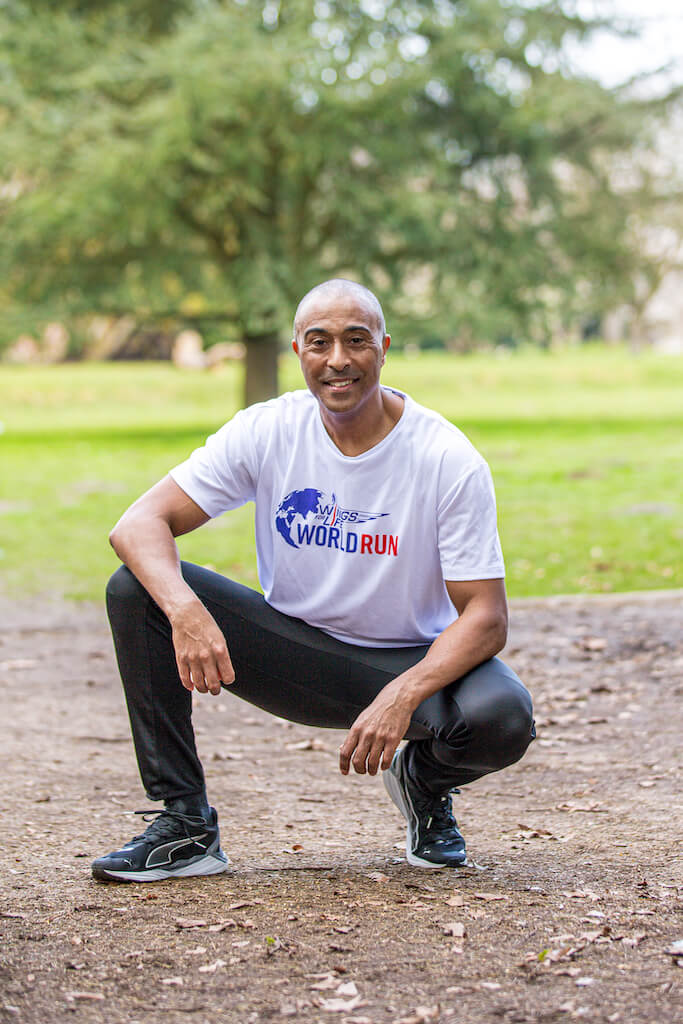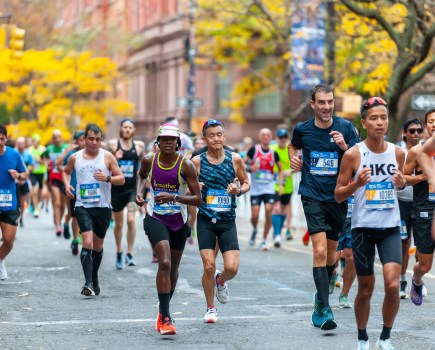Colin Jackson knows a thing or two about speed. The former 110m hurdle world record holder has firmly embedded himself into British running folklore – known for his fast starts and perfect form across the track.
Since hanging up the spikes, Colin Jackson has become an ever-present athletics commentator and presenter, and committed wholeheartedly to helping others get active.
Ahead of the Wings For Life World Run (one of the world’s largest virtual app runs) on 8 May 2022, Colin Jackson shared the following get-quick tips to help you build speed and power.

Colin Jackson won an Olympic silver medal, became world champion twice, and went undefeated at the European Championships for 12 years
Colin Jackson’s top tips to run quicker
1. Buddy up
Having a running partner will massively help your training. Set goals with a friend and hold yourself accountable to them. Nobody wants to be out in the wind and rain after a long day on their own. Buddy up and set each other challenges, cheering each other on.
For example: find a short hill of about 250m, that’s about a mile away from home, slow jog there and set each other the task of 10 hill sprints each – fast as you can to the top – and walk it back.
Getting quicker up hills is a brilliant way to reduce your running times, and having someone going through the pain with you will really help.
2. Gain muscle
Improving strength in the gym or at home will have a massive impact on your form and speed.
Bring some plyometric exercises into your sessions to improve explosive power – these can be done in the gym or at home, as there is no need for equipment. They can even be done as part of your speed run sessions.
RELATED: 5 of the best plyometric exercises for explosive power
Mix it up with something like 4 sets x 10 of jumping lunges, skater squats and standing long jumps.
3. Don’t neglect other cardio
As a runner, we can often be guilty of thinking the only way to get quicker is to run… wrong. There’s a huge variety of cardio and strength-based exercises that will help your power, speed and endurance.
Interval training is perfect for this: a HIIT class or MetCon class will get your heart rate up and demand a lot from your body, no matter your fitness levels.
Weave some of that into your training plan and you’ll soon feel the benefit out on the road.
4. Improve your efficiency
Understanding how to get from A to B with the least amount of effort and resistance possible is the goal, but all too often amateurs are guilty of overstriding and lunging forward. That is not only going to slow you down, but it’s going to cause havoc on your joints.
My tip here would be to watch elite athletes and professional runners to understand where their feet strike the ground and compare it to yours. If you’re lunging forward and landing well in front of your hips, try increasing your cadence with a shorter stride.
RELATED: 5 steps to improve your running technique
5. Use smart drills
While out on your runs, try including interval sessions with different exercises. We would spend hours on the track doing high knees and skipping forward to increase our speed and power.
Go for a slow jog and find a flat, straight piece of road, then try 4 sets of 30 seconds of high knees, getting your thighs high with your feet on the ground for as short a time as possible.
Then do the same session with skipping, looking to propel your body as high as you can get it, using your arms to help you jump into the air.
6. Set a goal
We all know goal setting is important. From amateurs to elites, it’s crucial to have something to work towards.
Make it specific: if you want to improve a 5k by a certain time or to take on longer distances, make sure you know what it is you want and you’ll be able to make a plan for it.
7. Rest = speed
Don’t get me wrong, sitting on the sofa all the time won’t make you quick, but you can’t go fast if your body isn’t fully recovered – that’s a fact.
Overtraining is a mistake so many people make when wanting to get faster, suddenly trying to reach a new goal and blasting their body in the process.
Take the time to recover properly if you have a specific target race or event in mind. Tapering correctly and being fresh on the start line is far more important to speed than most people think.







